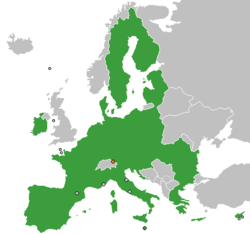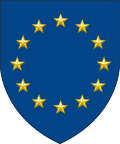Liechtenstein–European Union relations
Relations between the Principality of Liechtenstein (German: Fürstentum Liechtenstein) and the European Union (EU) are shaped heavily by Liechtenstein's participation in the European Economic Area (EEA).
 | |
EU |
Liechtenstein |
|---|---|
Market access
Liechtenstein is the only microstate (not counting Iceland by population) that is part of the EEA. Liechtenstein joined the EEA on 1 May 1995 after becoming a full member of the European Free Trade Association (EFTA) in 1991 (previously, it had participated in EFTA through Switzerland's membership). All EFTA states bar Switzerland are in the EEA, which gives them access to the EU single market. It also obliges Liechtenstein to apply European Union laws considered EEA-relevant. As of June 2016, around 5,000 of 23,000 EU legal acts in total were in force in the EEA.[1] There is some further cooperation with the EU via Switzerland as Liechtenstein is highly integrated with the Swiss economy (including using the Swiss franc).[2]
Schengen
On 28 February 2008, Liechtenstein signed the Schengen Agreement and became part of the Schengen Area on 19 December 2011.[3] Before this, Switzerland shared an open border with Liechtenstein and was already a full Schengen Area member. This open border was not considered a threat to European security because it would be highly difficult to enter Liechtenstein without first landing in or entering a Schengen state. The border with Austria was not open, and it was treated as an external border post by Austria and Liechtenstein, making it necessary to pass through customs and passport control before crossing.
Liechtenstein signed a Schengen association agreement with the European Union on 28 February 2008,[4] and originally planned to join the Schengen Area on 1 November 2009. However, ratification was initially delayed at the behest of Sweden and Germany who felt that Liechtenstein had not done enough to fight tax evasion;[5][6] the Council of Ministers eventually consented to the ratification of the protocol on 7 March 2011,[7] with the protocol entering into force a month later.[8] Liechtenstein was due to join the Schengen Area by the end of 2011[9][10] and did so on 19 December.
Other agreements
There are further bilateral agreements between the two parties on matters such as taxation of savings. There are also ongoing talks on combating fraud and exchanging information on tax matters.[2]
References
- "Directory of European Union legislation - EUR-Lex". Eur-lex.europa.eu. 2016-05-19. Retrieved 2016-06-03.
- Principality of Liechtenstein, European External Action Service
- Trukhachev, Vadim. "Tiny state lost in the Alps becomes more accessible to foreigners". Pravda.Ru. Pravda. Retrieved 22 December 2011.
- Protocol between the European Union, the European Community, the Swiss Confederation and the Principality of Liechtenstein on the accession of the Principality of Liechtenstein to the Agreement between the European Union, the European Community and the Swiss Confederation on the Swiss Confederation’s association with the implementation, application and development of the Schengen acquis (OJ L 160, 2011, 18 June 2011, p. 3).
- "Liechtenstein threatened with Swiss border controls". the Economist. 29 February 2008. Retrieved 11 August 2010.
- "Liechtenstein's Schengen-Accession Stopped". SR international—Radio Sweden. 19 May 2009.
- "3073rd Council meeting, Employment and Social Policy (Provisional Version)" (PDF) (Press release). Council of the European Union. 7 March 2011. p. 17. Archived from the original (PDF) on 19 July 2011. Retrieved 8 March 2011.
- Notice concerning the entry into force of the Protocol between the European Union, the European Community, the Swiss Confederation and the Principality of Liechtenstein on the accession of the Principality of Liechtenstein to the Agreement between the European Union, the European Community and the Swiss Confederation on the Swiss Confederation’s association with the implementation, application and development of the Schengen acquis (OJ L 160, 18 June 2011, p. 50).
- AFP (7 March 2011). "Le Liechtenstein intègre Schengen". Le Figaro. Retrieved 8 March 2011.
- "Fürstentum Liechtenstein neues Mitglied im Schengenraum". Stern.de. 7 March 2011. Archived from the original on 17 September 2011. Retrieved 8 March 2011.
